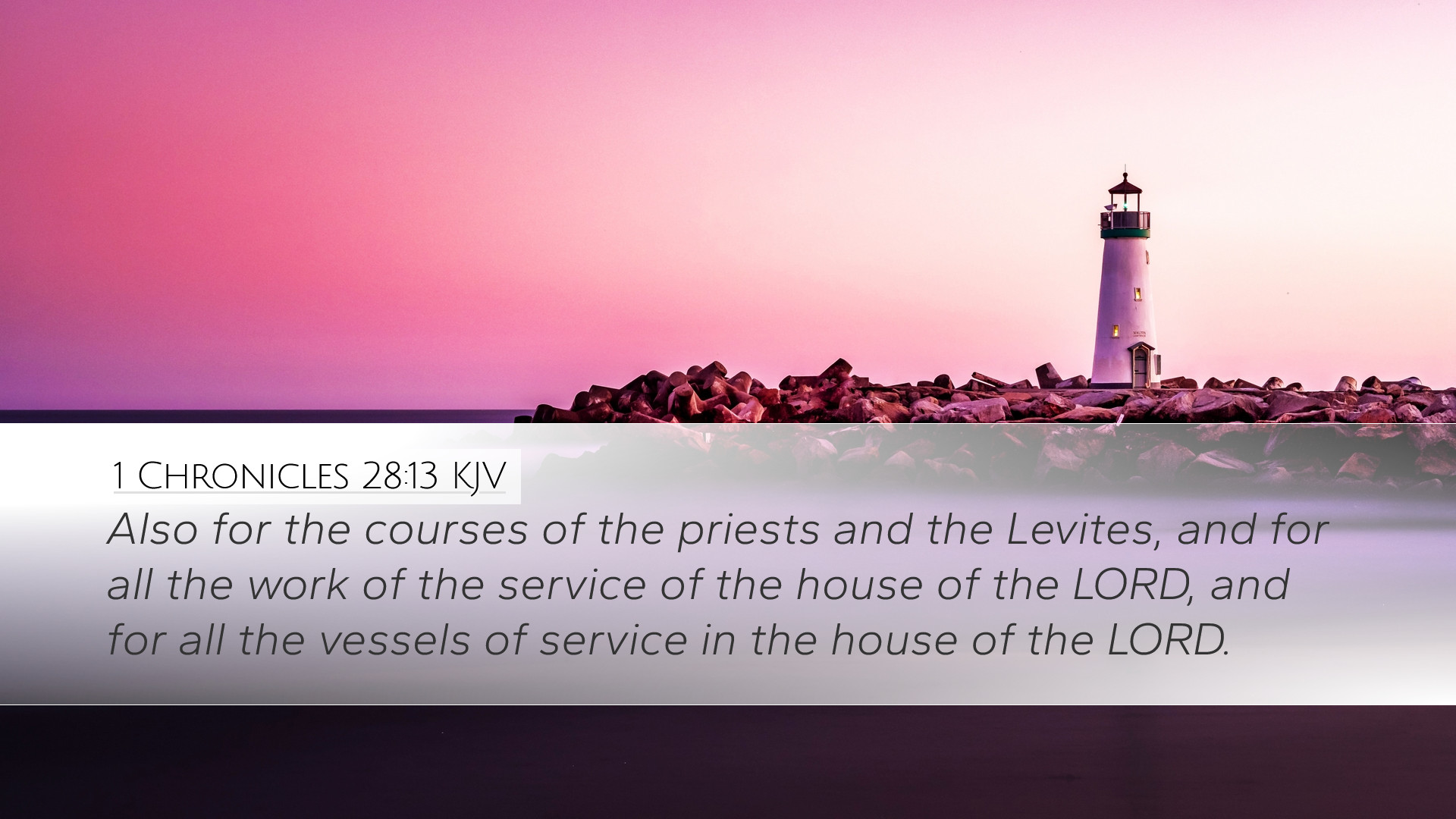Commentary on 1 Chronicles 28:13
Verse: 1 Chronicles 28:13 - "And of all that he found in the spirit of the Lord, and of his kingdom, he showed the house. The reason for which that he might be able to make a house for the Lord, and to establish the kingdom of the Lord in the house."
Contextual Background
This verse falls within a larger context where King David summons the leaders of Israel to announce Solomon as his successor and the plans for the temple's construction. 1 Chronicles provides a retrospective view of Israel's history, focusing on its significance, especially the transition of leadership and the establishment of temple worship.
Insights from Matthew Henry
Matthew Henry notes that David's provision for the temple's construction reflects not only his heart for the Lord but also his understanding of the sacred responsibility that lay upon the leaders of Israel. Henry emphasizes how David, inspired by the Lord, outlines the materials and the plans necessary for building the temple. He points out that God had given David peace and success, which in turn, allowed him to make a significant contribution to the house of God.
Insights from Albert Barnes
Albert Barnes elaborates on the significance of receiving divine instructions. He points out that David's detailed plans for the temple can be viewed as an acknowledgment of God's sovereignty. Barnes underscores the importance of obedience to God's directives in the construction of the temple. He notes that the temple is meant to be a place of worship, representing God's dwelling among His people, and that its foundation rests upon divine guidance.
Insights from Adam Clarke
Adam Clarke offers a deeper dive into the symbolism of the temple as a representation of God's presence among the Israelites. He reflects on the meticulous details David passes on regarding the size, materials, and design of the temple, associating it with the concept of holiness. Clarke encourages readers to see this effort as an act of devotion that transcends mere architectural construction, transforming it into a covenantal act of worship.
Theological Implications
This verse carries profound implications for understanding God’s relationship with His people. The act of establishing a house for God symbolizes the desire of a community to dwell in covenant with Him. The interplay of divine initiative (God providing the plans) and human response (David’s obedience in carrying them out) speaks to the collaborative role of believers in God's redemptive story.
Divine Guidance
- The importance of seeking God’s direction in undertaking spiritual endeavors.
- God’s meticulous nature in imparting wisdom and vision for sacred projects.
Leadership Responsibility
- David’s model of leadership as one that includes provision, direction, and vision for future generations.
- The legacy of a spiritual leader who prepares the way for his successor.
The Nature of Worship
- The temple as more than a physical structure; it embodies godly worship and communal identity.
- Engaging with God in holiness and reverence through dedicated spaces.
Practical Applications
This verse and its commentary can serve as an encouragement for pastors, students, and theologians in their life and ministries:
- Intentional Planning: Just as David meticulously planned the temple, church leaders should take seriously the calling of preparing spaces for worship.
- Community Engagement: Engage the community in understanding the importance of the church as a physical representation of God’s presence among them.
- Generational Leadership: Prepare the next generation of leaders, as David did with Solomon, instilling in them the importance of devotion to God’s work.
- Spiritual Discernment: Encourage a culture of seeking God's directives in all church initiatives and personal endeavors.
Conclusion
The insights derived from 1 Chronicles 28:13 invite a deeper appreciation of the role of sacred spaces, the nature of divine guidance, and the responsibilities of leadership within the community of faith. As we reflect on David's commitment and God's providence, may we be inspired to dedicate our lives and our communities to the honor of God's name, establishing places where worship abounds and His presence resides.


